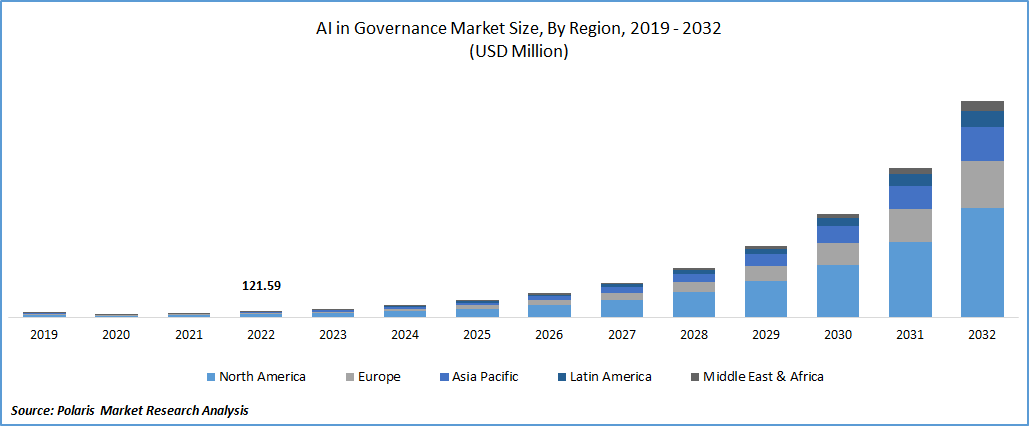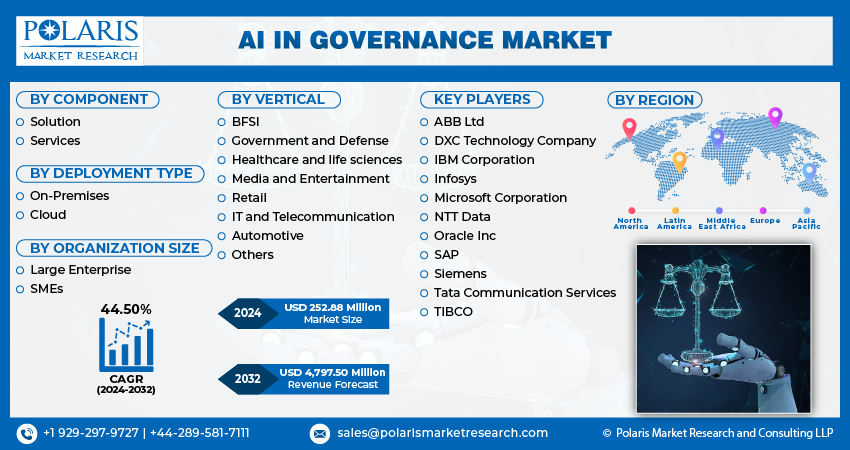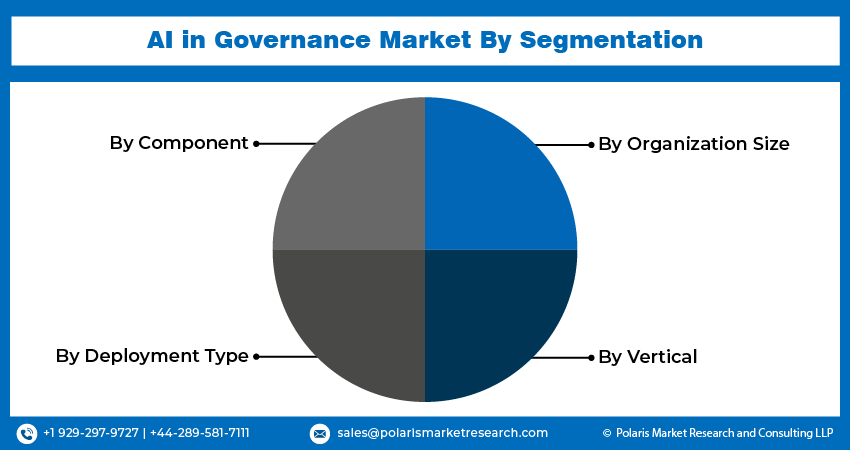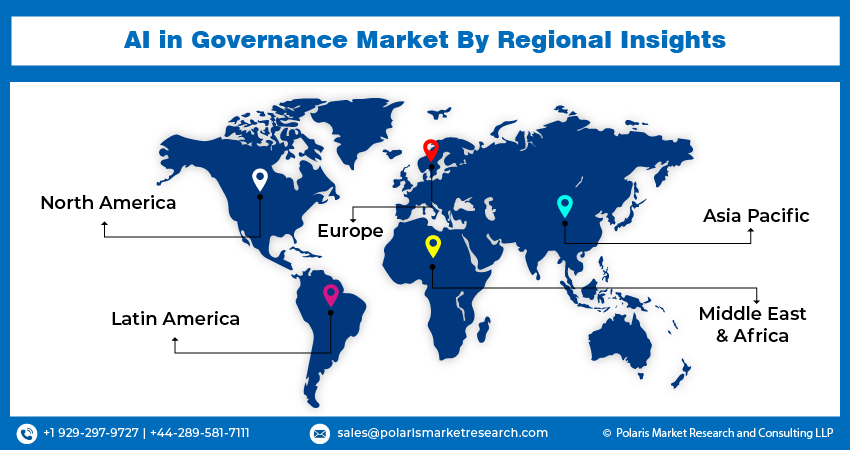
AI in Governance Market Share, Size, Trends, Industry Analysis Report, By Component (Solution, Services), By Deployment (On-Premises, Cloud), By Organizational Size, By Vertical, By Region, And Segment Forecasts, 2024 - 2032
- Published Date:Jan-2024
- Pages: 115
- Format: PDF
- Report ID: PM3567
- Base Year: 2023
- Historical Data: 2019-2022
Report Outlook
The global AI in governance market size and share was valued at USD 175.32 million in 2023 and is expected to grow at a CAGR of 44.50% during the forecast period. Application of AI to address gender inequality, along with government initiatives, modernization of data architecture, bridging the ethical-accountability gap, backend process automation, and the adoption of chatbots and robot advisors, are key factors driving the growth of the global market. These factors reflect the increasing recognition of the importance of responsible and ethical AI practices across industries. AI-assisted backend process automation improves operational efficiency, reduces human errors, and enhances customer experience. This is particularly relevant in banking, financial services, and insurance (BFSI) sectors, where chatbots and AI-powered assistants are used for customer interactions and financial product recommendations. Adopting these AI technologies drives the growth of the AI governance market in the BFSI industry.
AI governance refers to guardrails that are put in place to ensure the ethical and responsible use of AI technologies. It’s concerned with the establishment of frameworks, rules, and standards that address risks such as bias and privacy infringement while developing trust and innovation. An ethical approach to AI governance needs the involvement of several parties, including users, developers, policymakers, and ethicists. This ensures that the AI systems are developed and used in a way that aligns with the values of society.
The ethical development of AI systems is largely based on four principles, which include empathy, bias control, transparency, and accountability. AI governance tends to address the flaws that may arise from the human element when creating and maintaining AI systems. As people engineer AI systems, they’re susceptible to human errors and biases. AI governance provides a structured approach to diminish these risks, ensuring that AI algorithms are regularly monitored, updated, and evaluated to prevent biased or harmful decisions. AI in governance finds applications in several sectors, including BFSI, healthcare and life sciences, retail, IT and telecommunication, and the automotive industry. The need to address regulatory requirements and rising emphasis on developing AI ethics frameworks are the primary factors driving AI in governance market growth.
The market research report offers an in-depth analysis of the industry to support informed decision-making. It offers a meticulous breakdown of various market niches and keeps readers updated on the latest industry developments. Along with tracking the AI in governance market on the basis of SWOT and Porter’s Five Forces models, the research report includes graphs, tables, charts, and other pictorial representations to help readers understand the key insights and important data easily.

To Understand More About this Research: Request a Free Sample Report
The BFSI industry is increasingly leveraging chatbots and robot advisors for financial services. These AI-powered tools provide personalized recommendations, financial advice, and smart wallet management. Adopting chatbots and robot advisors is driven by the need for enhanced customer experience, increased efficiency, and cost savings. This further contributes to the growth of the market.
AI in governance market expansion is driven by the need to address regulatory requirements, industry-specific considerations, the emergence of specialized consulting services, and the growing awareness of AI's risks and challenges. This focus on AI governance aims to foster responsible AI development, enhance trust, and mitigate the potential negative impacts of AI technology. Governments and regulatory bodies increasingly recognize the need to establish guidelines and regulations to ensure AI technologies' responsible and ethical use. These regulations address data privacy, algorithmic bias, transparency, and accountability. Organizations invest in AI governance as the regulatory landscape evolves to ensure compliance with these requirements.
Different industries have unique considerations and challenges when it comes to AI governance. Sectors such as healthcare, finance, transportation, and autonomous systems require specialized frameworks to address AI adoption's specific risks, safety concerns, and ethical implications in their respective domains. Industry-specific AI governance frameworks and guidelines are being developed to provide tailored solutions. With the increasing demand for AI governance expertise, consulting firms and specialized service providers are emerging to assist organizations in implementing effective AI governance strategies. These services may include conducting AI risk assessments, developing ethical frameworks, establishing governance policies, and providing ongoing monitoring and compliance support.
Explainability and transparency in AI systems have become critical factors for trust and accountability. Understanding and explaining the decisions made by AI algorithms is gaining importance, especially in sectors where AI impacts individuals' rights and freedoms. Organizations are investing in AI governance practices that ensure explainable AI and mitigate algorithmic bias to build trust and address concerns around fairness and accountability. As AI technology becomes more prevalent, there is a growing recognition of the potential risks and challenges associated with its use. Issues such as biased decision-making, unintended consequences, job displacement, and cybersecurity threats drive the need for robust AI governance frameworks. Organizations and governments invest in AI governance to proactively address these risks and ensure responsible AI development and deployment.
Many organizations are integrating AI governance into their broader risk management frameworks. This involves identifying and evaluating the potential risks associated with AI systems, implementing controls and governance mechanisms to mitigate those risks, monitoring risk levels over time, and reporting on AI-related risks and liabilities. By incorporating AI governance into existing risk management practices, organizations can effectively manage and mitigate the potential impacts of AI.
Industry Dynamics
Growth Drivers
As the use of AI becomes more prevalent across industries, there is a growing need for AI governance solutions that can effectively address the ethical, legal, and societal implications of AI systems. Several platforms and tools have emerged to facilitate AI governance practices. Explainability is crucial for understanding how AI systems make decisions. XAI solutions provide transparency by enabling users to comprehend the reasoning behind AI algorithms. These tools help to identify biases, ensure fairness, and enhance accountability by providing insights into the factors influencing AI outcomes.
Addressing algorithmic bias is a significant aspect of AI governance. Tools for bias detection and reduction help identify biases in training data and algorithms, allowing organizations to take corrective actions. Organizations can strive for fairness, inclusivity, and ethical decision-making in AI systems by mitigating biases. Various organizations have developed AI ethics frameworks to guide the responsible development and deployment of AI. These frameworks provide guidelines and principles for organizations to consider ethical considerations throughout the AI lifecycle. They address privacy, accountability, transparency, and human rights issues, offering a comprehensive approach to AI governance.

Report Segmentation
The market is primarily segmented based on by component, deployment type, organization size, vertical, and region.
|
By Component |
By Deployment Type |
By Organization Size |
By Vertical |
By Region |
|
|
|
|
|
To Understand the Scope of this Report: Speak to Analyst
Solution segment accounted for the largest market share in 2022
The solution segment accounted for the largest market share in 2022. This dominance is expected to continue throughout the forecast period, primarily due to the presence of diverse market competitors. These solution providers focus on meeting the growing customer demand across various industry verticals by continuously offering innovative and technologically advanced solutions.
The rising demand for AI governance solutions drives the growth of services such as software integration and education programs. The need for expert assistance in implementing AI governance systems and integrating them into existing infrastructures fuels the demand for integration services. Developing training and education programs also underscores the industry's commitment to promoting ethical AI practices and enhancing awareness of AI's ethical and legal consequences.
Furthermore, businesses are recognizing the importance of AI governance training and education programs to ensure a better understanding of AI's ethical and legal implications. These programs aim to assist individuals and organizations in navigating the complexities of AI governance. For example, Intel introduced an educational program in collaboration with the CBSE in 2021. This program offers free online courses on AI ethics and ethical AI development, providing a basic understanding of artificial intelligence for citizens.
On premises segment garnered the largest revenue share in 2022
On-premises segment held the largest revenue share. Data governance, explainable AI, and integration with DevOps workflows are significant trends in the market. These trends reflect the increasing importance of AI governance and the need for businesses to manage the governance of their AI systems effectively. Furthermore, the demand for a traditional on-premises environment that provides a consolidated network infrastructure with robust security measures is expected to drive significant growth in the on-premises category. The on-premises approach offers enhanced control and security, ensuring that sensitive data and AI systems are protected within the organization's infrastructure.
The cloud segment witnessed steady growth. Cloud service providers are actively integrating AI governance tools into their platforms to address the growing demand for ethical and responsible AI practices. By incorporating AI governance features, these providers empower organizations to implement governance mechanisms and ensure ethical AI development and deployment. This trend reflects the increasing recognition of the importance of moral and responsible AI in the industry.
Government and Defense segment dominated the market in 2022
Government & defense dominated the market in 2022. AI in healthcare and life sciences presents unique challenges related to privacy, data security, and ethical considerations. These sectors deal with sensitive patient data, making privacy and data protection crucial. As a result, there is a growing emphasis on ensuring that AI systems used in these industries comply with data privacy laws and are safeguarded against potential cyber threats.
Furthermore, healthcare professionals increasingly leverage AI to assist with diagnosis and therapy. However, the application of AI in these contexts raises concerns about bias and accuracy. To address these concerns, it is vital to ensure that AI systems undergo proper validation and training before being deployed in clinical settings. This includes rigorous testing and validation processes to mitigate potential biases and provide accurate and reliable outcomes.

North America region dominated the global market with considerable market share in 2022
North America dominated the global market with a considerable market share. The region's leadership position can be attributed to the increased utilization of AI by commercial and governmental organizations, the development of AI regulations, and businesses' early adoption of AI technologies. In recent years, American legislators and government organizations have been actively developing plans and regulations to address the challenges associated with AI technology. These efforts aim to strike a balance between mitigating the potential negative impacts of AI and fostering healthy competition and advancements in the field.
Europe is a crucial market for regulating AI, with a strong focus on data privacy and ethical considerations. The region has implemented significant regulations like the General Data Protection Regulation (GDPR) and introduced the AI Act, which addresses data privacy, bias, discrimination, and algorithmic transparency. These regulations have been adopted or proposed to ensure responsible and ethical AI practices within the European Union. In addition to regulatory efforts, there is a growing emphasis on establishing frameworks and norms for AI ethics. Organizations like the European Alliance and the high-level expert group on AI are leading the way in this regard. They are crucial in shaping AI governance policies and promoting ethical AI development and deployment practices.

Competitive Insight
Some of the major players operating in the global market include ABB Ltd, DXC Technology Company, IBM Corporation, Infosys, Microsoft Corporation, NTT Data, Oracle Inc, SAP, Siemens, Tata Communication Services, and TIBCO.
Recent Developments
- In February 2023, Accenture & Google Cloud partnered to provide customers with enhanced data organization and real-time access to key indicators within their supply chain, including sales, inventory, logistics, and procurement.
AI in Governance Market Report Scope
|
Report Attributes |
Details |
|
Market size value in 2024 |
USD 252.88 million |
|
Revenue Forecast in 2032 |
USD 4,797.50 million |
|
CAGR |
44.50% from 2024 – 2032 |
|
Base year |
2023 |
|
Historical data |
2019 – 2022 |
|
Forecast period |
2024 – 2032 |
|
Quantitative units |
Revenue in USD million and CAGR from 2024 to 2032 |
|
Segments Covered |
By Component, Deployment Type, Organization Size, Vertical, By Region |
|
Regional scope |
North America, Europe, Asia Pacific, Latin America; Middle East & Africa |
|
Key Companies |
ABB Ltd, DXC Technology Company, IBM Corporation, Infosys, Microsoft Corporation, NTT Data, Oracle Inc, SAP, Siemens, Tata Communication Services, and TIBCO. |
Gain profound insights into the 2024 AI in governance market with meticulously compiled statistics on market share, size, and revenue growth rate by Polaris Market Research Industry Reports. This thorough analysis not only provides a glimpse into historical trends but also unfolds a roadmap with a market forecast extending to 2032. Immerse yourself in the comprehensive nature of this industry analysis through a complimentary PDF download of the sample report.
Browse Our Top Selling Reports
Post-consumer Recycled Plastics in Consumer Electronics Market Size, Share 2024 Research Report
Atopic Dermatitis Clinical Trials Market Size, Share 2024 Research Report
Orthopedics Braces and Supports Market Size, Share 2024 Research Report
Europe Homogeneous Precious Metal Catalyst Market Size, Share 2024 Research Report
FAQ's
The global ai in governance market size is expected to reach USD 4,797.50 million by 2032.
Key players in the ai in governance market are ABB Ltd, DXC Technology Company, IBM Corporation, Infosys, Microsoft Corporation, NTT Data, Oracle Inc
North America contribute notably towards the global ai in governance market.
The global ai in governance market is expected to grow at a CAGR of 44.4% during the forecast period.
The ai in governance market report covering key segments are component, deployment type, organization size, vertical, and region.
